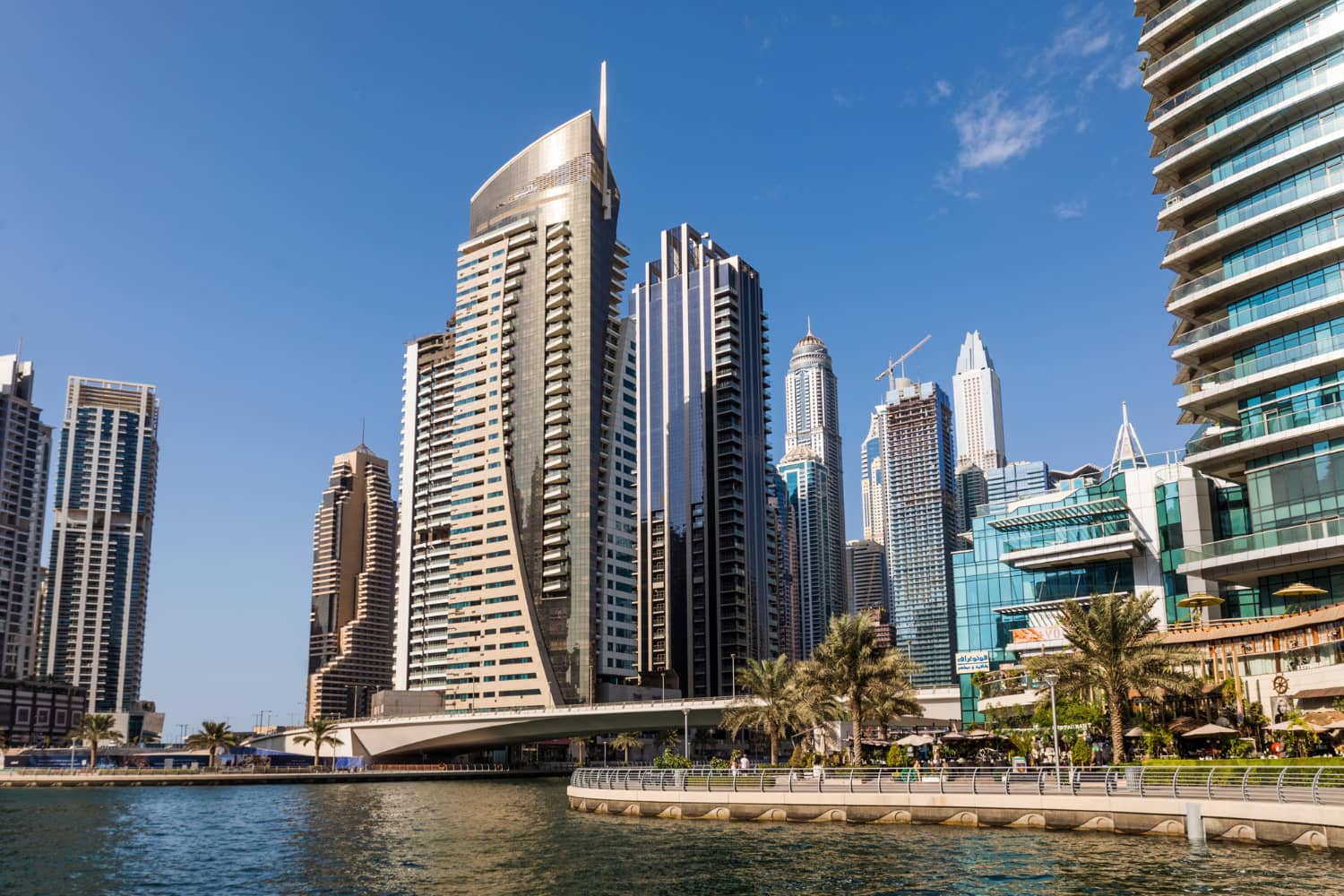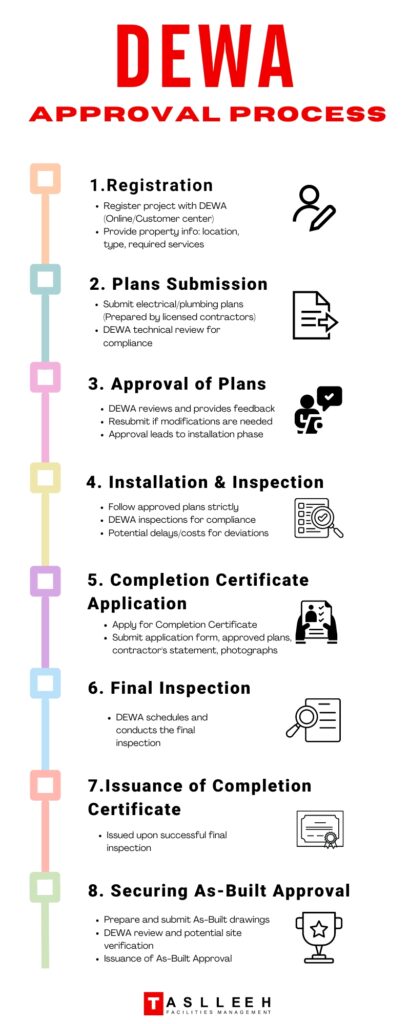Demystifying DEWA Approvals: A Comprehensive Guide for DEWA Approval in Dubai

Dubai is a land of dreams.it propels your ideas and helps you in getting to next level. Being a part of the growth of Dubai can drive your business to next level. But for this to happen, you will need to understand and obtain Dubai Electricity and Water Authority (DEWA) approval. So, let’s understand DEWA and why it’s crucial to obtain DEWA approvals to embark on your dream venture.
What is DEWA?
DEWA is short for Dubai Electricity and Water Authority that handles water and electricity supply in Dubai. It is a public utility company that was established on January 1, 1992. It is responsible for ensuring that you have safe and reliable electricity and water.it is responsible for technological advancements, from energy generation to smart home solutions and big data management, addressing challenges and creating new opportunities in the utility sector.
With a workforce of over 9,000 employees, DEWA serves more than 600,000 electricity customers and 500,000 water customers.
DEWA-Services Overview
The Services of DEWA can be classified into three

1)Electricity Network Services
a) Getting electricity connections
This service helps enrolled contractors and consultants to obtain power connections to the various projects and buildings.
b)Getting electricity fit-out connections
This service helps enrolled contractors and consultants to obtain power supply connection to consumer’s shell and core/fit-out installations.
c)Getting Solar Connections
This service helps DEWA enrolled Solar Consultants / Contractors are able to apply for Solar Permits & Connections
2)Water Network Services
a) Getting Water Connections
This service helps enrolled contractors and consultants to obtain water connections to the various projects and buildings.
b) Water Network Modification
This service helps enrolled contractors and consultants to obtain technical services related to the modification of water network
3)NOC Services
a)Building NOC-Electricity/Water
This service qualifies enrolled contractors and consultants to obtain Electricity or Water No Objection Certificate for building permit
b)Malem Dubai Approval
This service qualifies major project Developer/Consultant to register their projects and submit documents for DEWA review/approval.
c)Demolishing Permits- Electricity/Water
This service permits DEWA enrolled Demolition Contractors to apply for Combined demolition application through the system after uploading the required documents
DEWA Approval Process-Overview
DEWA is the government authority to approve all the power and water requirements for emirate of Dubai. They need to approve all the construction activities. The DEWA Approval process can be little confusing, but if you can follow the flow chart, you can be on your way
DEWA Approval Process:-

The DEWA application process ensures that all electrical and water installations in your property adheres to the necessary standards and regulations. This process is important not only for safety but also for ensuring the proper functioning of utilities within your property.
Step 1: Initial Registration
To initiate the DEWA application process, you must register your project with DEWA, which can be done online through their website or by visiting one of their customer service centers. You will need to provide fundamental information about your property, including its location, type (residential, commercial, or industrial), and the services you require (electricity, water, or both).
Step 2: Submission of Plans
After registration, you need to submit detailed electrical and plumbing plans for your property, prepared by licensed contractors to comply with DEWA’s standards and specifications. The plans will undergo review by DEWA’s technical team to ensure they meet all necessary requirements.
Step 3: Approval of Plans
Once the plans are submitted, DEWA will review them and provide feedback. If modifications are necessary, you will be notified and required to resubmit the updated plans. Upon approval, you can proceed with installation work.
Step 4: Installation and Inspection
During the installation phase, it is essential to strictly adhere to the approved plans. DEWA may conduct periodic inspections to ensure compliance, and any deviations could lead to delays or additional costs.
Step 5: Completion Certificate Application
After completing the installation work, you must apply for a Completion Certificate, which verifies that all electrical and water installations have been completed according to the approved plans and DEWA’s standards. To apply, you need to submit:
– A completed DEWA application form
– A copy of the approved plans
– Contractor’s completion statement
– Test reports for electrical installations
– Photographs of the completed work
Step 6: Final Inspection
Following the submission of your application for the Completion Certificate, DEWA will schedule a final inspection of your property. During this inspection, DEWA officials will thoroughly check all installations to ensure they meet safety standards and comply with the approved plans.
Step 7: Issuance of Completion Certificate
If the final inspection is successful, DEWA will issue the Completion Certificate. This document is vital as it confirms that your property’s electrical and water installations meet all necessary standards and regulations.
Securing As-Built Approval
While obtaining the Completion Certificate is a significant milestone, the process does not conclude there. The next step involves securing As-Built Approval from DEWA, confirming that the actual construction and installations match the initially approved plans.
Step 1: Prepare As-Built Drawings
Upon completing your project, you must prepare As-Built drawings, accurately reflecting the final state of your property’s electrical and water installations, including any changes made during construction.
Step 2: Submit As-Built Drawings
Submit the As-Built drawings to DEWA along with a completed application form, ensuring all drawings are clear, accurate, and include all necessary details as per DEWA’s requirements.
Step 3: DEWA Review
DEWA will review the submitted As-Built drawings to ensure they accurately represent the completed work and comply with all standards and regulations.
Step 4: Site Verification
In certain cases, DEWA may conduct a site visit to verify that the As-Built drawings accurately represent the actual installations on your property.
Step 5: Issuance of As-Built Approval
If everything is in order, DEWA will issue the As-Built Approval. This document is essential for future reference and any potential modifications to your property’s electrical or water systems.
Hacks for a Smooth DEWA Approval Process
Gather Necessary Documents: Make sure you have all required documents like your passport, visa, Emirates ID, and others before starting the application.
Sign Contracts with the Government Entity: Understand and sign the necessary contracts outlining project terms and approval processes.
Submit the Application for Approval: Provide all necessary documents, such as the application form, site and plot plans, proposal plan, villa typology, property title deed, NOC, and any required guarantees.
Receive Feedback and Make Necessary Changes: Address any feedback from DEWA promptly, preferably with professional help.
Follow Up on the Application Status: Regularly check the status of your application online, via phone, or in person.
DEWA Approvals: Documents Needed
Basic Blocks:
- DEWA-approved blueprints (TCL/MDBs/SMDBs): These are your electrical system’s architectural plans, ensuring seamless design and safety. Think of them as your electrical roadmap.
- Load distribution schedule: This detailed document maps your electricity flow, balancing the load for optimal performance and preventing any flickering moments.
- Wiring layouts: Separate plans for lighting and power circuits reveal the path taken by your electrical currents, like a GPS for electrons.
Extra Requirements:
- Landlord NOC (in DEWA format): If you’re not the property owner, this formal consent from the landlord is crucial for DEWA connection.
- Tenancy contract, trade license, and passport copy: These verify your legal status and occupancy to receive DEWA services.
DEWA Approved Contractor in Dubai?
The whole process of approvals can be confusing and time-consuming. Hence, DEWA has a list of DEWA approved contractors who can make your life easier. These contractors are duly certified and will help in all stages of DEWA approvals.
Taslleeh approvals team has in-depth knowledge and experience in dealing with DEWA approvals as a DEWA approved contractor and can guide you through the intricacies of the approval process. We are an approved consultant having handled over thousands of DEWA approval cases and assist you in getting the approval done in best possible time. We can help you understand the regulations, gather the necessary documents, complete the application, and ensure compliance with the requirements. By working with a DEWA approved contractor like us, you can save valuable time and resources, and navigate the DEWA approvals process with confidence
DEWA Approvals-FAQs
How can an electrical engineer get DEWA approved?
Dewa Approved contractor Requirements:
- University degree (Bachelor of Civil/Electrical Engineering)
- Pre-Qualification certificates from Dubai Municipality (showing approved contractor)
- Trade license issued by the Department of Economic Development (DED)
- Experience certificate (minimum of three years) attested by UAE Ministry of Foreign Affairs (if not issued in the UAE)
- UAE Society of Engineers membership
How long does it take to obtain DEWA approval?
The time is subjective depending on the type of project and the information required. But we can help you get the same in the least possible time frame
What are documents required for DEWA approval?
- DEWA-approved blueprints (TCL/MDBs/SMDBs).
- Load distribution schedule
- Wiring layouts for Power
- Wiring layouts for lighting
- NOC from landlord in DEWA format
- Trade licence
- Tenancy contract
- Passport
- Ejari